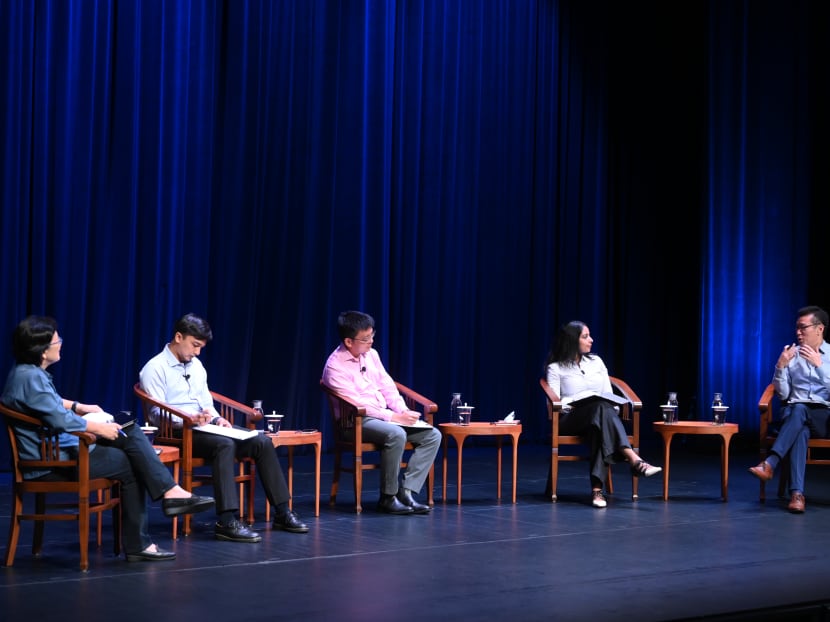Teachers play key role in educating students to identify racism: Panel
SINGAPORE — Children here need to be better educated on what racism is, with teachers playing a key role in doing so, panellists at a forum on race said on Friday (June 25).

The panel members at a forum on race held on June 25, 2021, by the Institute of Policy Studies and the S Rajaratnam School of International Studies.
- Children need better education on racism, with teachers playing a key role, panellists at a forum said
- Dr Laavanya Kathiravelu of NTU said teachers should also be trained to identify their biases
- Professor Paulin Straughan noted that this could place pressure on teachers who already juggle many responsibilities
- Racism is an “existential issue” and education on the issue should start as early as preschool, Assoc Prof Daniel Goh of NUS said
SINGAPORE — Children here need to be better educated on what racism is, with teachers playing a key role in doing so, panellists at a forum on race said on Friday (June 25).
Stressing his point, one of the panellists, Associate Professor Daniel Goh, expressed surprise that his friends were unable to identify racist remarks or incidents in the wake of recent publicity over such incidents.
“Quite interestingly, in the past two weeks, I’ve had friends who come up to me and ask me what racism is,” the sociologist at the National University of Singapore (NUS) said.
“We seem to lack the knowledge of racism and I think the question that was posed (earlier) to (Finance) Minister Lawrence Wong was really good. Should we start introducing anti-racism pedagogies in schools to let people know what racism is so that they can recognise it, identify it and deal with it and fight it more effectively?”
Assoc Prof Goh was speaking at a forum hosted by the Institute of Policy Studies and the S Rajaratnam School of International Studies (RSIS).
The forum, which was moderated by sociologist Paulin Straughan, also featured Associate Professor Elmie Nekmat from the department of communications and new media at NUS, Dr Laavanya Kathiravelu, a sociologist from the Nanyang Technological University (NTU) and Mr Goh Sin Teck, the editor of Chinese daily Lianhe Zaobao.
Before the panel began, Finance Minister Lawrence Wong had taken part in a question-and-answer session with Dr Shashi Jayakumar, the head of RSIS’ Centre of Excellence for National Security.
Dr Shashi had asked Mr Wong, who was the forum’s keynote speaker, if the Government would consider adapting overseas pedagogies that promote an understanding of diversity to ingrain children here with multiracialism.
To this, Mr Wong said that a 2017 study by NTU researchers showing that preschool children here favoured their own race was a reminder that it is “human instinct to be comfortable with our own”.
While Singapore should be open to pedagogies on teaching children to appreciate diversity, these pedagogies should not be “transplanted” wholesale from other countries but adapted to the local context, Mr Wong added.
YOUNGER GENERATION TAKE RACISM FOR GRANTED
During the panel discussion that followed, Assoc Prof Goh said that while the older generation had lived through racial riots and related events in Singapore, the younger generation assume that racism is something that happened in the past and tend to take racism for granted. As a result, many in the majority Chinese race do not understand what racism is.
It is important to teach the younger generation how to recognise racism, especially those in the majority racial group who do not experience racism in their everyday lives, he added.
Chiming in, Dr Laavanya said that in addition to introducing racism as a topic in schools, education institutions should also train teachers to spot and guard against their own racial biases.
Such institutional-level changes will also influence how people think at an individual level, she said.
Citing the example of former Ngee Ann Polytechnic lecturer Tan Boon Lee who was sacked after making racist remarks to his students and an inter-racial couple, Dr Laavanya said that training teachers to identify implicit biases was especially important as this could influence the way they grade students.
“If we really want to uphold meritocracy as a value, then we need to think about how racism can infiltrate into a place like schools and destroy meritocratic standards.”
EDUCATION ON RACISM STARTS IN SCHOOLS
Assoc Prof Goh also agreed that education on racism have to start in schools.
Addressing Mr Wong’s point that it is human instinct to be comfortable with those of the same race, Assoc Prof Goh said that a lot of that instinct is learnt by young children in their homes and in schools.
“I know there’s a lot of stress, a lot of pressure on teachers, but if this is an existential issue. We have to do it right in the school,” he said, adding that education should start as early as in preschool.
However, Prof Straughan questioned if expecting educators to teach racism in schools could place pressure on teachers who are already saddled with other responsibilities such as ensuring children have adapted to the school environment.
To this, Dr Laavanya said that school counsellors or other educators in an institution could educate students on racism.
Assoc Prof Goh also said that teachers should be equipped with the resources to teach racism to children. For example, the Ministry of Education could prepare anti-racism kits to help teachers teach young children to identify racism.
Assoc Prof Elmie highlighted how information or visual portrayals of other races in the media also contributed to attitudes that parents and their children have of other races.
When Prof Straughan asked what else could be done to help young Singaporeans to identify racist expressions, Assoc Prof Goh suggested that besides the Government, other institutions that do not usually touch on issues of racism, such as museums and cultural organisations, can step in to organise forums or workshops on the issue.








